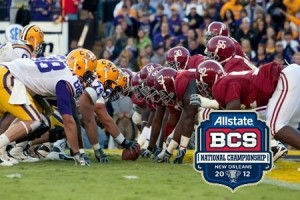 Alabama’s dominance in the BCS title game means more than just a national championship. Undoubtedly, merchandise sales, sponsorship and endorsement opportunities and other income opportunities will be on the rise as a result of the Crimson Tide’s dismantling of their conference rival.
Alabama’s dominance in the BCS title game means more than just a national championship. Undoubtedly, merchandise sales, sponsorship and endorsement opportunities and other income opportunities will be on the rise as a result of the Crimson Tide’s dismantling of their conference rival.
Of course, as conference champions and perennial title contenders, I’m sure LSU has no shortage of demand for affiliations with the Bayou Bengal brand as well.
While some people may disagree, I would submit that championships alone don’t sell t-shirts. It also takes a recognizable and powerful brand to make merchandise fly off the shelves. This article takes a quick look at the branding strategies of the two BCS finalists.
Alabama Crimson Tide
The University of Alabama owns several trademarks that are affiliated with the school’s athletic programs. These include several logos incorporating the well-known stylized “A”, as well as various permutations and combinations of “Alabama”, “Crimson Tide”, “Roll Tide”, and the school’s elephant mascot.
These trademarks are registered with the USPTO in connection with everything from key rings to bar stools to educational services.
Perhaps one of the university’s most well-known trademarks (at least for college football fans) is the Crimson Tide’s iconic, some may say plain, football uniforms. While schools like Oregon roll out new uniforms on what seems like a weekly basis (this is part of their branding strategy), Alabama’s uniforms have stood the test of time, and have come to represent the stability, power and reputation of Nick Saban’s team.
LSU Tigers
Is it me, or does “Louisiana State” just not do it for you? “LSU” seems to have much more mass appeal, and I’m sure it is no accident that these initials have come to identify the Bayou Bengals’ Alma Mater.
LSU also owns several registered trademarks relating to the Tigers’ athletic programs. LSU’s trademarks include the football helmet itself, the university’s current leaping tiger logo, and “Geaux Tigers”. Similar to Alabama, LSU’s trademark registrations cover all types of merchandise, as well as educational and entertainment services.
Who Owns the Honey Badger?
Another interesting trademark issue relates to the nickname “Honey Badger” for LSU’s star defensive back. There are no pending trademark registration applications apparently owned by anyone affiliated with LSU for the nickname, although one individual in Alabama did apply to register the trademark for use on apparel in December 2011.
If someone affiliated with the football program or institution were to apply for registration, who would it be? The school? The athletic department? The player? And what goods or services would the trademark cover? The answers, it seems, would depend on who started using the trademark first for commercial purposes (if this hasn’t been done already)—if not the regulations governing student athletes.
Also, trademarks that identify living persons require the living persons’ consent to the application—and this applies to nick names as well. (Somewhat famously, a Chicago-based merchant was recently denied trademark registration for “Lady Gaga” based on its failure to obtain the pop star’s consent.)
What this Means for You
Athletic teams actually serve as great models for trademark protection for startups and other businesses. Sports teams constantly strive to maintain relevance and mass appeal for their brands, and they work tirelessly to maintain exclusive control over their public image. Businesses that rely on recognition and reputation need to take similar steps to protect their trademark rights.
Next time you’re at a game or a sporting goods store, take a look at the display of merchandise for each team (or apparel brand, for that matter). Despite the wide variety of products, you will find that there are limited and carefully-selected number of logos to choose from. This prevents dilution of the brand, and helps combat counterfeiters and infringers. All brand owners should take similar steps to protect the exclusivity of their trademarks.
Jeff Fabian helps business owners protect their brands so that they can stay focused on running their businesses. Visit http://etrademarksolutions.com for more information. You can also follow Jeff on Twitter @jsfabian.



